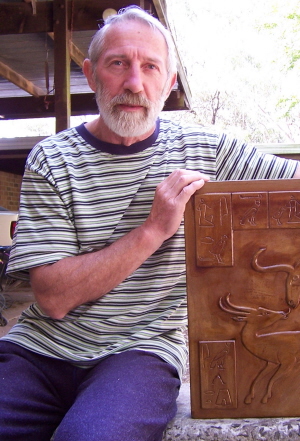LUCATO, George
Lucato Peace Prize Sponsor
George Lucato is committed to peace. He sponsors an art prize at Federation University Australia promoting peace over war. While growing up in Italy in the early 1950's his first recollection of war was seeing posters at primary school about avoiding unexploded bombs. He soon after realised that World War II had resulted in the loss of millions of lives along with untold property and culture.
He moved to Australia with his family in his mid teens and 15 years later the subject of war and peace came up in a philosophy tutorial at Monash University. In his still tentative English he told the class he was completely against war, any war. The lecturer pointed out that was a big statement and asked if he, Lucato, wanted to put his money where his mouth was. Mr Lucato explained that he was a mature-age student and had no money at that point, but when he became a teacher he decided to put two weeks' salary towards a prize on that same theme, that "peace is always better than war."
Although he lived in Ballarat, the now retired secondary school teacher first approached his alma mater, but was knocked back. The now 30 year old Lucato Peace Prize was finally accepted by the former Caulfield Technical Institute and then the Victorian College of the Arts before finding its current home at Federation University Australia in 2004.
The 2004 Lucato Peace Prize was won with a song by musical theatre student Kerrin Whiting who said: 'song has been a vital tool in communicating messages and emotions. In musicals, a song takes the place of a dialogue when the emotion is so intense, it cannot be expressed with just words. With the brief that 'Peace is Always Better Than War', I found the key word was ALWAYS. I used music and lyrics to address a child and the future, while the chorus is thought provoking for a present audience. I believe they will be left to reflect and ponder possible solutions.'
Andrew Broughton won the 2005 Lucato peace prize with a multimedia presentation. Broughton explained: "I wanted to create something that showed both sides of peace and war, I wanted to do this in a way that doesn't shock the audience but makes them look at it in a light mannered nature. ... with peace more superior to war, it will always dominate in the end."
"Burden" by Emily Duggan won the 2006 Lucato Peace Prize. It features found and pre-loved objects, photocopies, plastic flowers and a mirror. The artists cautions the viewer with the following words: "Take care when exploring through the work or you may get cut by your own reflection and what you find in the bottom of the casket . . ."
In 2007 Robert Kelty's ceramic work "The Faceless and Forgotten" comprised five tormented and faceless heads, partly representative of the men, women and children who suffer from war, famine and oppression. The artist believes that giving each of them human features is to embrace them as ourselves, to deny them that simiture is to justify any atrocity in advance.
Michelle Nelson's work 'In Our own Backyard" comments on reconciling difference. She said of her work, "February 12, 2008 is a date so significant to our country and will continue to be, as on this date we witnessed Kevin Rudd apologising to the Indigenous population of Australia on behalf of the Australian Government. This portrait is a commemoration to the past mistreatment and the war we know as the stolen generation. We can see today this apology was a symbol of healing, a time to bring together a national and to -turn the page in history'.
The importance of a spoon to a prisoner of war is the focus of the winning 2009 Lucato Peace Prize. Phil Berry's Jack was inspired by the artist's Uncle Jack, a former prisoner of war at Changi in World War 2. Upon repatriation to Australia Jack was emaciated and clutched his prize possession, an old spoon. Part of his daily life during the extreme hardship of the camp, the spoon was a symbol of his survival, a constant in extreme uncertainty. The artist recalled that once Jack was home again he married, started a family and embraced peace. The coming of peace had given back what was had nearly taken away. "He was a kind and gentle man, I was fortunate to have known him".
The Lucato Peace Prize winners are:
- 2004 Kerrin Whiting
- 2005 Andrew Broughton
- 2006 Emily Duggan
- 2007 Robert Kelty
- 2008 Michelle Nelson
- 2009 Philip Berry
- 2010 Philip Berry
